#grand duchess Olga Konstantinovna of Russia
Explore tagged Tumblr posts
Text
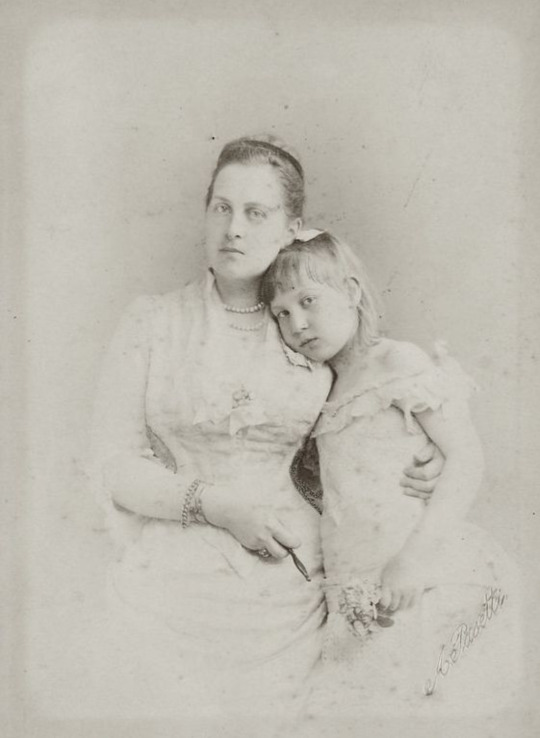
Rare photo of Queen Olga of Greece (née Grand Duchess Olga Konstantinovna of Russia) with 5th child and 2nd daughter Princess Marie of Greece and Denmark (later Grand Duchess Maria Georgievna of Russia), mid 1880s
#rare#Olga konstantinovna#queen olga of greece#queen Olga of the Hellenes#princess marie of greece and denmark#princess maria of greece and denmark#Maria Georgievna#grand duchess Maria Georgievna of Russia#grand duchess Olga Konstantinovna of Russia#russian imperial family#Greek royal family#Greece#Romanovs#Romanov#russian history#1880s#mid 1880s#1800s#Victorian era
17 notes
·
View notes
Text
Grand Duchesses at the Coronation of Nicholas II and Alexandra Feodorovna
Nicholas II and his consort Empress Alexandra, were crowned on Tuesday, 14 May (O.S., 26 May N.S.) 1896, in Dormition Cathedral in the Moscow Kremlin. The magnificence of the occasion was never again seen in Russia. The Grand Duchesses were in full regalia. Here are two great photographs of them.

Above:
Sitting: Grand Duchess Alexandra Iosifovna (who had been present at the coronation of Alexander III); sitting on the floor at her knees is Princess Olga of Wurttenberg; sitting next to Alexandra Iosifovna is Princess Louise Margaret, Duchess of Connaught
Back Row Standing from Let to Right: Grand Duchess Vera Konstantinovna, Grand Duchess Anastasia of Mecklenburg-Schwerin, Grand Duchess Maria Pavlovna (the elder), Grand Duchess Elena Vladimirovna, Grand Duchess Elizabeth Mavrikievna, and Princess Elena of Saxe-Altenburg

Above:
In the center of this group, is Grand Duchess Marie Alexandrovna, (daughter of Tzar Alexander II, wife of Queen Victoria's second son Alfred, Duke of Saxe Coburg and Gotha, who is standing behind her.)
On the right side of Grand Duchess Marie Alexandrovna, is her daughter Victoria Melita, Princess of Saxe-Coburg and Gotha. Sitting to the left of her mother is the Crowned Princess of Romania, Marie (same name as her mother; known by the family as Missy). Her husband the Crowned Prince of Romania, Ferdinand, is standing slightly to the side, behind Missy.
Next to Ferdinand of Romania is Ernest Louis, Grand Duke of Hesse and By Rhine, husband of Victoria Melita at the time and brother of the Empress being crowned, Alexandra Feodorovna. To the right of Victoria Melita is her brother, Prince Alfred of Saxe-Coburg and Gotha who died at age twenty-four.
#Grand Duchess Vera Konstantinovna#Grand Duchess Alexandra Iosifovna#Grand Duchess Anastasia Mikhaelovna#Grand Duchess Anastasia of Meklenburg-Schewrin#Grand Duchess Marie Alexandrovna#Grand Duchess Elizabeta Mavrikievna#Grand Duchess Elena Vladimirovna#Princess Victoria Melita#Marie#Crown Princess of Romania#Missy#Princess Elena of Saxe-Altenburg#Princess Louise Margaret Duchess of Connaught#Princess Olga of Wurttenberg#imperial russia#romanov dynasty#Nicholas and Alexandra#Nicholas II#Coronation
31 notes
·
View notes
Text

#Queen Olga of Greece#1860s#Romanov#Colorized Photo#Colorization#Colorized#Grand Duchess Olga Konstantinovna#Russia#Victorian
8 notes
·
View notes
Text

3 notes
·
View notes
Text

Grand Duchess Olga Konstantinovna of Russia in Russian Court Dress. 1860s.
#art#aesthetic#art history#historical fashion#fashion#historical art#women in art#women#victorian#victorian aesthetic#olga konstantinovna#konstantinovichi#romanovs#romanov family#olga of Greece#Greek royals#Russian royals#imperial Russia#Romanov#imperial russian fashion#russian court dress#victorian fashion#1860s#photography#black and white photography
23 notes
·
View notes
Note
Hey I wonder, how many branches are there in the Romanov family, anyway?
It depends on how you want to divide them up!
Most historians tend to do it by the sons of Nicholas I, so we end up with: The Alexandrovichi - Alexander II and his descendants. This group is sometimes subdivided by Alexander II's sons, so we have the continuation of the Alexandrovichi with Alexander III, and then the Vladimirovichi (descendants of Vladimir Alexandrovich) and Pavlovich (descendants of Pavel Alexandrovich). I don't tend to label things as 'alexandrovichi' because they're the main line of the Imperial Family.
The Konstantinovichi - Descendants of Konstantin Nikolaevich. This can include the Greek Royal Family as their founding matriarch was Konstantin's daughter, Olga Konstantinovna. But usually people think of the poet Konstantin Konstantinovich (KR) and his many children.
The Nikolaevichi - descendants of Nikolai Nikolaevich Sr. He only had two children, Nikolai Nikolaevich Jr (Nikolasha) and Peter Nikolaevich, and of the two, only Peter had children of his own, so it's a small branch.
The Mikhailovichi - the descendants of Mikhail Nikolaevich. This includes Sandro, the husband of Nicholas II's sister Xenia, so her kids are technically part of the Mikhailovichi branch but you could argue they are Alexandrovichi through their mother. Also OTMAA's playmates Nina and Xenia Georgievna are in this branch.
Another major branch are the Leuchtenbergs, who are the descendants of Nicholas I's daughter Maria and her husband Maximilian of Leuchtenberg. They lived in Russia, were granted the style of Imperial Highness, and while their title was Prince/ss Romanovsky, they were essentially treated like Grand Dukes/Duchesses.
13 notes
·
View notes
Text
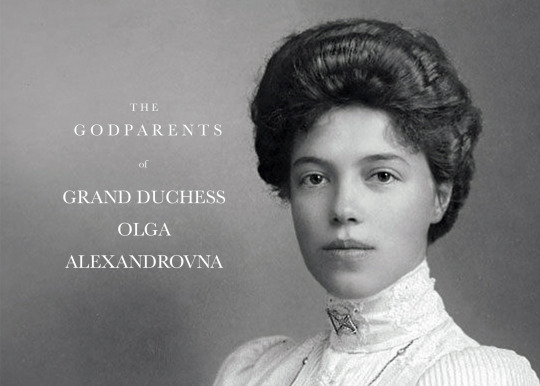
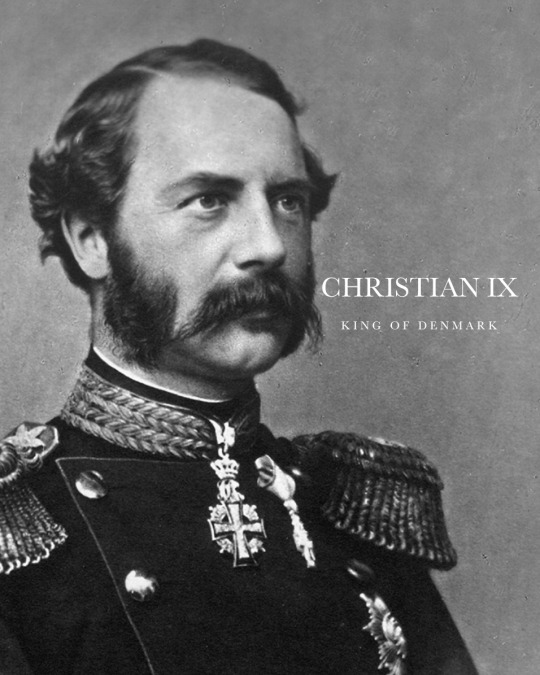
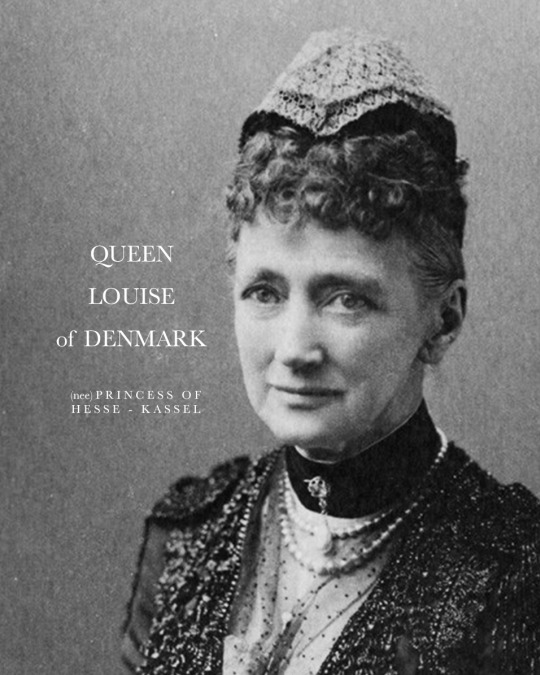



GODPARENTS OF GRAND DUCHESS OLGA ALEXANDROVNA
Grand Duchess Olga Alexandrovna, the youngest daughter of Emperor Alexander III of Russia, was born on 13 June 1882 at Peterhof Palace in Saint, Petersburg, Russia. She was christened on 23 July (Saint Olga's Day) in the Grand Palace Church, Peterhof by the Confessor of Their Imperial Majesties archpriest Bazhanov. Her godparents as listed:
KING CHRISTIAN IX OF DENMARK - her maternal grandfather, the Danish King was among her godparents. His initial unpopularity at the start of his reign, and the many years of political strife, where the king was in conflict with large parts of the population, his popularity recovered towards the end of his reign, and he eventually became a national icon due to the length of his reign. He was absent at the christening of his Russian grandchild.
PRINCESS LOUISE OF HESSE-KASSEL, QUEEN CONSORT OF DENMARK - his maternal grandmother was another of her godparents. Louise became the Queen consort of Denmark upon her husband’s - King Christian IX - accession in 1863. Through her six children, she was a grandmother of not only the future Tsar of Russia (Nicholas II, Olga's eldest brother), but also that of King George V of the United Kingdom; King Constantine I of Greece; King Christian X of Denmark, and King Harken VII of Norway. Like her husband, Louise was also absent at the christening.
GRAND DUCHESS OLGA NIKOLAEVNA OF RUSSIA, QUEEN CONSORT OF WÜRTTEMBERG - her great-aunt was one of her godparents. She was the younger sister of her late grandfather, Alexander II. Attractive, cultured and intelligent, she had been considered to be one of the most eligible princesses in Europe. In 1846, she married Crown Prince Karl of Württemberg. She was absent at the christening of her namesake.
GRAND DUCHESS OLGA KONSTANTINOVNA OF RUSSIA, QUEEN CONSORT OF GREECE - her aunt and namesake was named as one of her godparents. Olga Konstantinovna was the first cousin of her father Alexander III, being the eldest daughter of Grand Duke Konstantin Nikolaevich of Russia. At 16, she married King George I of Greece, the brother of her mother Maria Feodorovna. Queen Olga was a popular figure in Russia, and in Greece. She was present at the christening.
GRAND DUKE ALEXEI ALEXANDROVICH OF RUSSIA - her uncle was another listed godparent of the young grand duchess. A naval officer for most of his life, he had a significant contribution in the equipment of the Russian navy with new ships and in modernizing the naval ports. He was present at the christening of his niece.
Source
30 notes
·
View notes
Text
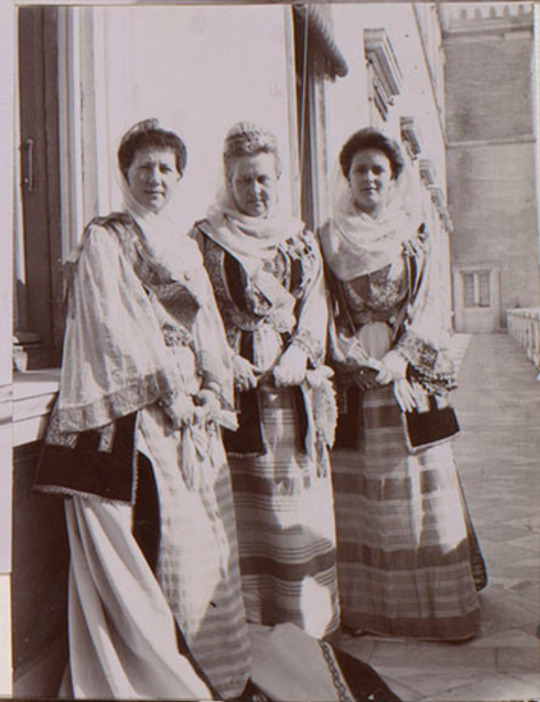
Queen Olga of Greece (née Grand Duchess Olga Konstantinovna of Russia) with her daughter Grand Duchess Maria Georgievna of Russia (née Princess Maria of Greece and Denmark) and her daughter in law Princess Alice of Greece and Denmark (née Princess Alice of Battenberg), all in traditional Greek costumes. Early 1900s
Source: Princess Victoria of Wales’s albums
#olga konstantinovna#queen olga of greece#maria georgievna#princess maria of greece and denmark#princess alice of battenberg#princess Alice of Greece and Denmark#princess alice#greek royal family#private albums#early 1900s
47 notes
·
View notes
Text
Here’s some AI-Generated Art of historical royals I created via an photo filter app. These were the ones I liked the best:
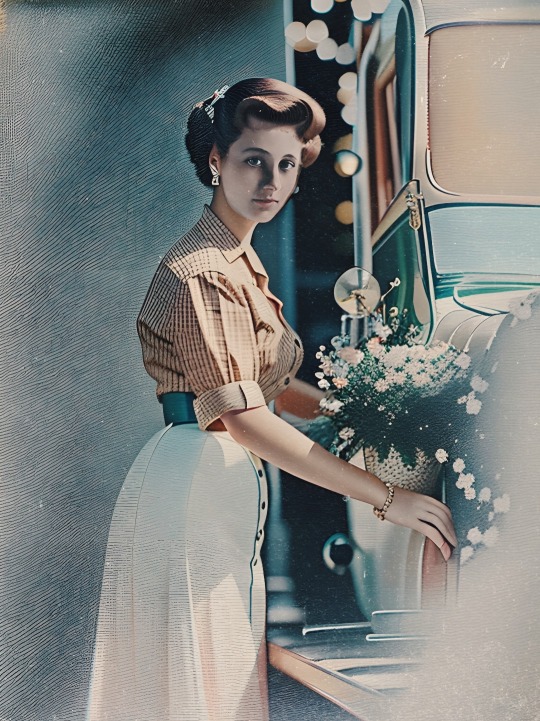
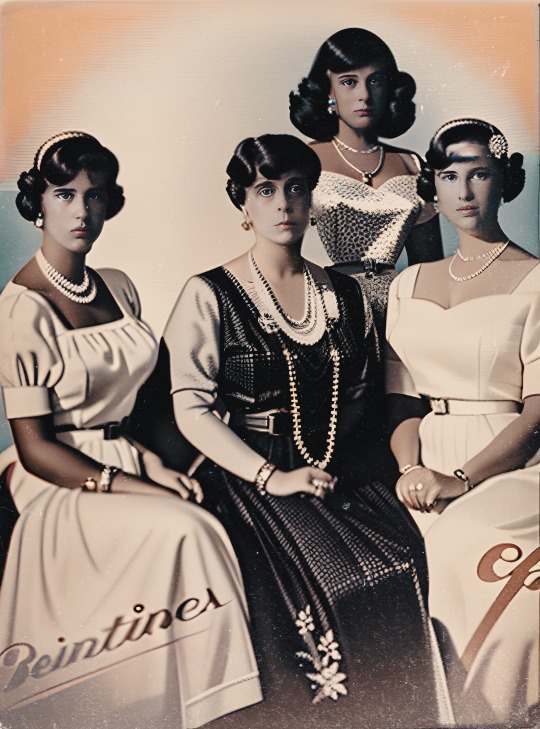
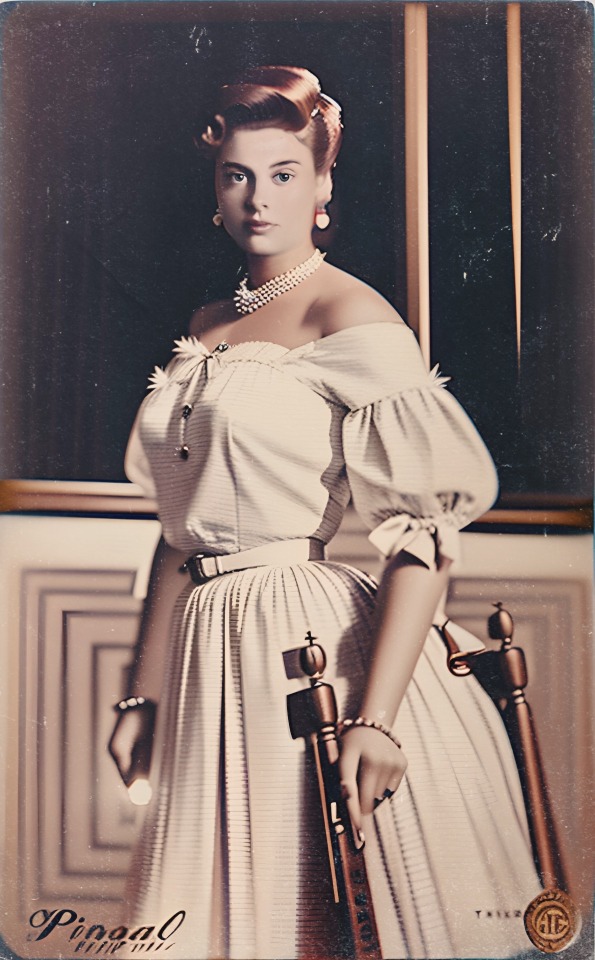

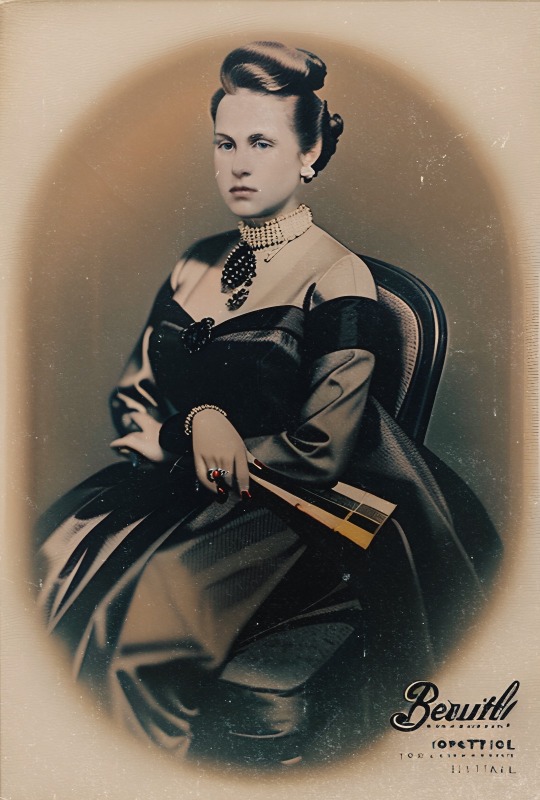
1. Princess Victoria Louise of Prussia.
2. Princess Helen of Greece and Denmark (née Grand Duchess Elena Vladimirovna of Russia) with her daughters Princesses Olga, Elisabeth and Marina of Greece and Denmark.
3. Crown Princess Cecilie of Prussia.
4. Queen Helen of Romania (née Princess Helen of Greece and Denmark) and
5. Queen Olga of Greece (née Grand Duchess Olga Konstantinovna of Russia).
#having fun#royalty#cecilie and helen could be actresses#I must say elena’s dress is too matronly for her taste#and i’m not a fan of olga’s hairstyle
15 notes
·
View notes
Note
i know this is a bit outside your purview but i was hoping you could help me - would you be able to recommend some memoirs of russian aristocrats from the imperial family's immediate circle who survived the revolution and settled in the west? something in the vein of felix yusupov or alexander mikhailovitch's memoirs, maybe? i'm interested in how they adjusted to the change in political and cultural circumstances. thanks in advance :)
Hello there!
Yes, I know of a few! I will also link you to Felix Yusupov and Alexander Mikhailovich’s memoirs, just in case you didn’t know they could be read online for free :) Where possible, I will include links to access them online for free.
Lost Splendour by Felix Yusupov
Once a Grand Duke by Alexander Mikhailovich
25 Chapters of my Life by Olga Alexandrovna - the later chapters detail how she, her husband, and two young children fled Russia
The Last Grand Duchess by Ian Vorres - a memoir written and based off interviews with Olga Alexandrovna, with quotes from her.
Vera by Paul Gilbert includes some memoirs by Vera Konstantinovna. The memoirs focus mostly on her childhood, but touch a little on the Revolution and her life in America after.
Memories of Russia, 1916-1919 by Princess Paley and John van der Kiste - more focus on the Revolution rather than settling elsewhere, but I hope it will be helpful!
Dancing in St. Petersburg by Mathilde Kschessinska - details her life as the first love of Nicholas II, her work as a Prima ballerina, her relationship with Grand Duke Andrei Vladimirovich. She and Andrei eventually fled Russia to France.
Not sure if this counts as he wasn’t Russian, but Tutor to the Tsarevich by Sydney Gibbes and J. C. Trewin details Gibbes’ life, including his fleeing to Asia and then to Oxford.
If you can speak French, this interview with Felix and Irina might be of interest to you. They talk mostly about Rasputin, but it does show their situation living outside of Russia.
Education of a Princess by Grand Duchess Maria Pavlovna details her marriage to Duke of Södermanland, which saw her relocate to Sweden
These aren’t memoirs but instead secondary sources, but I thought I would include them in case they were valuable to you. Once a Grand Duchess: Xenia by John van der Kiste and Coryne Hall details Xenia’s escape from Russia and her adjustment to life in England living in Frogmore Cottage, using sources in the form of letters written by Xenia herself.
I hope that this was somehow helpful! Enjoy your reading :)
24 notes
·
View notes
Text

New photo of members of the Greek and Russian Royal Families posted by Ilya aka LastRomanovs on Flickr and Sledstvie on Instagram
From left to right standing: Princess Marie of Greece and Denmark (later Grand Duchess Maria Georgievna of Russia), Grand Duke Georgy Alexandrovich of Russia, Grand Duke Mikhail Nikolaevich of Russia
From left to right sitting: Grand Duchess Xenia Alexandrovna of Russia, Tsarina Maria Feodorovna of Russia (née Princess Dagmar of Denmark), Prince Christopher of Greece and Denmark, Queen Olga of Greece and Denmark (née Grand Duchess Olga Konstantinovna of Russia)
No date of when and where this photo was taken was provided but it is most likely taken in the early 1890s (my guess is 1891) and probably when both Russian, Danish, and Greek royal families were in their yearly vacation to Denmark.
#thank you Ilya!#romanov#romanovs#russian imperial family#greek royal family#danish royal family#early 1890s#1891#1890s#Princess Marie of Greece and Denmark#Maria Georgievna#xenia alexandrovna#maria feodorovna#empress maria feodorovna#queen olga of greece#queen Olga of Greece and Denmark#Olga Konstantinovna#grand Duke Mikhail Nikolaevich of Russia#grand duchess Xenia Alexandrovna of Russia#grand Duke georgy alexandrovich of Russia#prince Christopher of Greece#Prince Christopher of Greece and Denmark#LastRomanovs#Sledstvie
13 notes
·
View notes
Text

Four Grand Duchesses, one also a Queen
In this photo, we see an elderly but impeccably dressed Grand Duchess Alexandra Iosifovna (1830 - 1911) surrounded by two of her daughters: To the left, Grand Duchess Vera Konstantinovna (1854 - 1912) and, to the right, Grand Duchess Olga Konstantinovna, Queen Consort of the Greeks (1851 to 1926). Directly behind Grand Duchess Alexandra Iosifovna, stands Grand Duchess Elizabeta Mavrikievna (1865 to 1927.)
Grand Duchess Alexandra Iosifovna, who had come to the Russian court during the reign of Alexander II, became a referent regarding the protocol for court ceremonies. She would not tolerate shabby manners from anybody...not even her grandchildren. She is reputed to have said that "....even babies should have good manners." She is Prince Phillip's great-grandmother.
#russian history#imperial russia#romanov dynasty#Grand Duchess Alexandra Iosifovna#Grand Duchess Elizabeta Mavrikievna#Grand Duchess Olga Konstantinovna#Grand Duchess Vera Konstantinovna
11 notes
·
View notes
Text

Grand Duchess Vera Konstantinovna of Russia (16 February 1854 – 11 April 1912), was a daughter of Grand Duke Konstantine Nicholaievich of Russia. She was a granddaughter of Tsar Nicholas I and first cousin of Tsar Alexander III of Russia.
She had a difficult childhood marked by illness and tantrums. In 1863, while her father was Viceroy of Poland, she was given away to be raised by her childless uncle and aunt, King Karl and Queen Olga of Württemberg. Vera's condition improved in their home and she outgrew her disruptive behavior. In 1871 she was legally adopted by Karl and Olga, who arranged her marriage in 1874 to Duke Eugen of Württemberg (1846–1877), a member of the Silesian ducal branch of the family. Her husband died suddenly three years later. Vera, only twenty-three years old, did not remarry, dedicating herself to her twin daughters. At the death of King Karl in 1891, Vera inherited a considerable fortune and she turned her home into a cultural gathering place. She was a popular figure in Württemberg, notable for her charitable work.
Grand Duchess Vera was known in royal circles as an eccentric both in appearance and behavior. Although she kept in touch with her Romanov relatives, visiting Russia many times, she identified more closely with her adopted country. In 1909 she abandoned Orthodox Christianity and converted to Lutheranism. She died two years later after a stroke.
#Vera Konstantinovna of Russia#House Holstein-Gottorp-Romanov#women in history#xix century#xx century
1 note
·
View note
Photo

Queen Olga of the Hellenes in a typical greek courtgown. Early 1870s
#Antique#vintage#victorian#19th century#court gown#Greece#1870s#Royalty#Queen Olga of the Hellenes#Grand Duchess Olga Konstantinovna of Russia
194 notes
·
View notes
Text
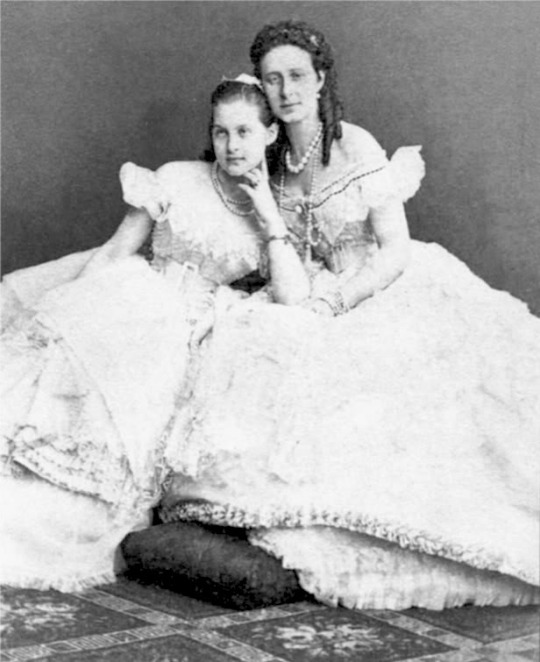
Grand Duchess Olga Konstantinovna of Russia (later Queen Olga of Greece) with her mother, Grand Duchess Alexandra Iosifovna of Russia (born Alexandra of Saxe-Altenburg). 1865.
#aesthetic#victorian#victorian aesthetic#fashion#historical fashion#women in art#1860s#1860s fashion#royal fashion#Russian royals#romanovs#Romanov family#fashion history#1865#1860s style#Victorian style#Victorian fashion#Russian fashion#1860s gown#1860s dress#royal dresses#royal aesthetic
40 notes
·
View notes
Note
Also a Russian article about Alexander and Olga Nikolaevna: (so that it would not be difficult for you, translation)
Speaking about the loves of Grand Duchess Olga Nikolaevna, it is impossible to ignore this one. Probably, it was a very short infatuation – maybe just a WILLINGNESS to fall in love – but it was this feeling that had every chance of getting continued. After all, Olga finally liked an equal in position: the prince of a foreign power.
In December 1913, Olga realized that her "sun" was Pavel Voronov (more?) he does not reciprocate her, and made several emotional entries about him in his diary, using a secret cipher. His behavior confuses and worries her, feelings are looking for a way out... on December 21, the denouement follows: "I found out that my S. is marrying Olga Kleinmichel. God send him happiness, my beloved S. It's hard. Sadly. He would be pleased." Olga also encrypted this entry. It would seem that the time has come to immerse yourself in experiences for a long time, but after a few weeks the mysterious cipher appears in the diary again. And if earlier he hid only declarations of love for Voronov, now Olga writes about something else (further encrypted fragments are italicized): "January 12. Alexander Serbian arrived (In Russian uniform. Wow, what eyes). January 15th. At 9:00, my Dad and Aunt and I went to St. Petersburg for the consecration of the new church of the Fedorovskaya Mother of God in honor of the 300th anniversary. It lasted from 10 to 1 ¼. Metropolitan, etc. A bright, large, good church. I was standing next to Alexander the Serbian, he was a little further away. Wow, wow what. January 17th. We had breakfast with Dad, Aunt, Kostya and Alexander. I sat with him. Cute, embarrassing and beautiful horror. Wow wow what. January 19th. Mom I don't know how. I fell asleep after 3 hours at night. God save her and everyone , and Alexander S. January 23. After in the Winter Courtyard. a big breakfast. Then we talked. I've been with Alexander for quite a long time. God save him. The 25th of January. We had breakfast with Papa, T. Olga, gr. Fredericks and Alexander S. He came to say goodbye. He's leaving in 2-3 days, it's a pity, dear."
Alexander Karageorgievich was 7 years older than Olga. He had a lot to do with Russia: he had Russian tutors, was the godson of Alexander III and the named son of Nicholas II; studied at the School of Jurisprudence and in the Page Corps in St. Petersburg. He became heir to the throne in 1909, after his elder brother George was forced to give up his rights to the throne under the pressure of a scandal. In the same year, Alexander almost asked for the hand of Princess Tatiana Konstantinovna. The Serbian minister and even the father-king personally made a cautious reconnaissance on this matter. But to the Konstantinovichs, the position of the Karageorgievich dynasty on the throne seemed too shaky. K.R., Tatiana's father, wrote in his diary: "I told her in detail about the claims of the Serbian court and about the reasons prompting us to advise her to refuse this offer. Although she rather likes Sandro Serbian, she did not hesitate to give him up." However, a year later the families still became related: Alexander's sister Elena married Grand Duke John Konstantinovich. For the Karageorgievichs, this was a great success, because they took the throne only in 1903 by a coup. In Europe, they were not really recognized, and not all Romanovs were disposed to them. In 1912-13, Alexander managed to show valor in the Balkan wars. And then he thought about getting married again, but now he was interested in the daughter of the tsar himself. ONLY WHICH ONE?
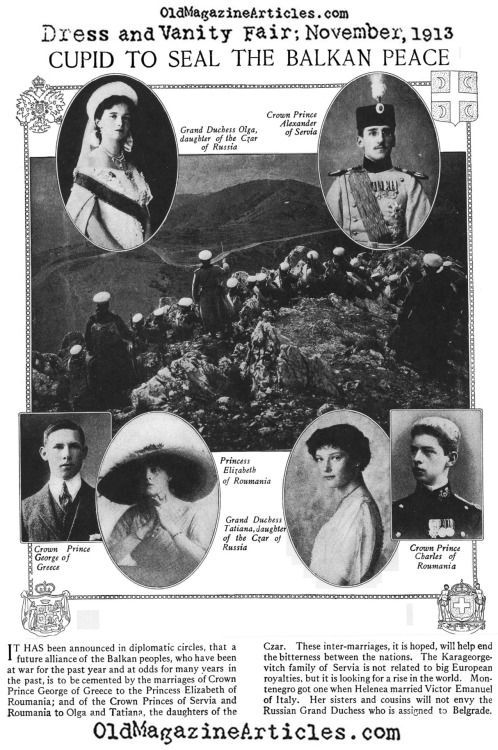
In this newspaper for November 1913, it was suggested that Olga would become the wife of Alexander of Serbia, and Tatiana – Karol of Romania. On the other hand, the English Wikipedia, with reference to Serbian archives, assures that Prime Minister Nikola Pasic wrote to Nicholas II in January 1914 about Alexander's intention to marry one of the Grand duchesses. Nikolai did not object and even noticed the interest that his daughter showed in the prince – but it was allegedly not Olga, but Tatiana. (And Russian Wikipedia generally assures: "Tatiana and Alexander wrote letters to each other until their death. When Alexander found out about Tatiana's murder, he was confused and almost committed suicide").Alexander's sister Elena, in her memoirs, which I have not yet been able to find, seemed to say that she noticed some "chemistry" between Alexander and Olga. Well, Olga's diary allows us to conclude that Alexander was not indifferent to her, and I think the Serbian heir himself paid attention to her. You can only guess what prevented you from taking the next step.In the spring, Olga is fond of Molokhovets, then the war begins, but all this does not prevent her from remembering Alexander on various occasions:"February 24.At 12 o'clock my mother received the Bavarian, Belgian, Danish and Serbian envoys (Nalajovic. So reminds Alexander C).February 25.(in small print: I haven't seen Alexander for a month since)March 25.I haven't seen Alexandra for 2 months. <...>(added, apparently, later) I haven 't seen Alexander S. for 2 months .September 4.The Pope gave Alexander of Serbia the St. George Cross 4 art . I am very happy. God help me.October 6.John, Gabriel and Kostya and Elena had lunch. They told me a lot of interesting things. She's a piece of Alexander, and I love her.October 16.At 7 o'clock we went to the infirmary with Mom, we went to everyone, and talked to K. and I. in the corridor. Everyone knows Alexander by his body."

Alexander was a thin brunette with a mustache and large facial features (and with "WOW" eyes) – this is exactly the type of appearance that has always attracted Olga. Besides, apparently, he was a really nice person. "The prince turned out to have a kind and friendly character," writes the grandson of his tutor, the famous priest Gleb Kaleda. "To please his tutor, the prince wrote to him in Russian, asking for forgiveness in advance for possible mistakes, although there were none." He was remembered as a tactful person, sometimes shy and prone to melancholy, a lover of reading – there is some similarity with Olga's character.Olga did not see Alexander again, but a year later she noted in her diary the anniversary of his arrival:"January 12, 1915.The year that I saw Alexander at Vsevolod's christening.January 15th.The year is consecrated. churches. Alexander.January 17th.Mordvinov and Count Fredericks were having breakfast. And a year ago Alexander. God bless him."It seems that even in the spring of 1916, Pasic expressed the hope that Olga would become the Serbian queen. But in January of this year, the date of the meeting with Alexander was not noted in the diary. At this time, Olga hardly thought about anyone other than Dmitry Shah-Bagov. (By the way, here her fate again intersects with the fate of Tatiana Konstantinovna, who was very friendly with the elder daughters of Nicholas II. Instead of the Serbian prince, she married a simple Caucasian officer for love, and he even served in the Erivan regiment – like Olga's lover. Because She even knew Shah Bagov and calls him a "cute, cute boy" in a letter. Surely Olga was thinking about what could repeat her path).But in 1917 Olga remembers again:"January 17th. Exactly 3 years ago today Alexander Serbsky had breakfast with us." Here the name is also written in cipher, and this is the last encrypted entry in the diary.
Olga Nikolaevna's biographers like to repeat that she wanted to stay in Russia, so she did not marry the Romanian heir Karol. The interest in Alexander the Serbian shows that, most likely, it was not in the country: it was just Karol who was unsympathetic to Olga. I think she understood that sooner or later she would have to leave her homeland. It is unlikely that the rumors had passed her by, she knew who her husbands were supposed to be, and she did not mind falling in love with a cute Orthodox prince. Maybe by the beginning of 17, she returned to thinking about him because someone had dispelled her hopes for a happy morganatic marriage? Although what could be a wedding when the revolution is already at the threshold. What kind of fate would await her in a small semi-literate kingdom, forever torn apart from the outside and from the inside?Alexander married in 1922 the sister of the same Karol (there is a version that he dragged on for so long, because until then he did not believe in the death of Olga). It seems that he became a good family man, ruled his country for more than 10 difficult years. Yugoslavia in the 20s became a fragment of the Russian Atlantis, the center of white emigration. Sometimes there is an opinion that Alexander was so supportive of Russian refugees in memory of his first love – "Olga/Tatiana." But I think Russia meant a lot to him anyway. Alexander was killed in 1934 by a terrorist, his family fled the Nazis during the war and never returned to their homeland. Well, instead of Maria, Olga could become a Romanian widow and exile… No matter how her fate turned out, it would not be easy. The time of the Slavic monarchs has passed.
Thank you for sharing!!
27 notes
·
View notes